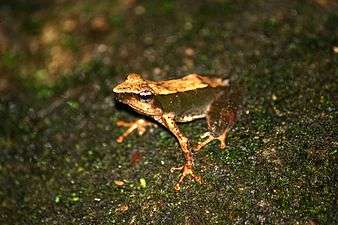Micrixalus adonis
| Micrixalus adonis | |
|---|---|
 | |
| Scientific classification | |
| Kingdom: | Animalia |
| Phylum: | Chordata |
| Class: | Amphibia |
| Order: | Anura |
| Family: | Micrixalidae |
| Genus: | Micrixalus |
| Species: | M. adonis |
| Binomial name | |
| Micrixalus adonis Biju et al., 2014[1] | |
Micrixalus adonis is a newly described species of frogs in the Micrixalidae family. It is endemic to the Western Ghats in southern India, restricted to areas between the Palghat Gap and Shencottah Gap.[2][1] Common name beautiful dancing frog has been proposed for this species, in reference to its vividly rich colouration.[1]
Description
M. adonis is within the colloquial Micrixalus fuscus group, including M. fuscus, M. herrei, M. kodayari, M. mallani, and M. nelliyampathi. The species share similar physical characteristics, including slender bodies, the presence of dorsolateral folds, and among others a V-shaped glandular ridge on the anterior half of the body. While being similar to other species within the Micrixalus fuscus group, M. adonis is most noticeably different in the shape of its head, which is rounded laterally. Males measure 22–24 mm (0.87–0.94 in) and females 27–30 mm (1.1–1.2 in) in snout–vent length.[1][1]
Foot-flagging has not been observed in this species, presence of flashy colouration on dorsal surface of the hind limb together with the degree of webbing and habitat preference suggest that it might nevertheless possess this behaviour.[1]
Habitat
Its natural habitats are rivers with a forested canopy. It is not known from any protected area.[1]
References
- 1 2 3 4 5 6 7 Biju, S. D.; Sonali Garg; K. V. Gururaja; Yogesh Shouche; Sandeep A. Walujkar (2014). "DNA barcoding reveals unprecedented diversity in Dancing Frogs of India (Micrixalidae, Micrixalus): a taxonomic revision with description of 14 new species". Ceylon Journal of Science (Biological Sciences). 43 (1): 37–123. doi:10.4038/cjsbs.v43i1.6850.
- ↑ Frost, Darrel R. (2016). "Micrixalus adonis Biju, Garg, Gururaja, Shouche, and Walukar, 2014". Amphibian Species of the World: an Online Reference. Version 6.0. American Museum of Natural History. Retrieved 21 April 2016.